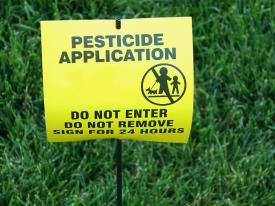 The Protect America Children from Toxic Pesticides Act of 2020 has been introduced into the House and Senate by Representative Joe Neguse (D-CO) and Senator Tom Udall (D-NM) Legislation would update the Federal Insecticide, Fungicide and Rodenticide Act (FIFRA) enacted almost 25 years ago. In terms of FIFRA, manufacturers of pesticides must show that their products if used in accordance with label restrictions will not cause “any unreasonable risk to man and to the environment, taking into account the economic, social and environmental cost and benefits of the use of the compound.”
The Protect America Children from Toxic Pesticides Act of 2020 has been introduced into the House and Senate by Representative Joe Neguse (D-CO) and Senator Tom Udall (D-NM) Legislation would update the Federal Insecticide, Fungicide and Rodenticide Act (FIFRA) enacted almost 25 years ago. In terms of FIFRA, manufacturers of pesticides must show that their products if used in accordance with label restrictions will not cause “any unreasonable risk to man and to the environment, taking into account the economic, social and environmental cost and benefits of the use of the compound.”
Since passage of FIFRA, evidence have emerged concerning the undesirable effects of some compounds including chlorpyrifos on neural development in children. The Udall Neguse-Sponsored Act would ban certain compounds, mandate a higher level of EPA surveillance and oversight and establish an adverse-effects reporting system.
It is noted that chlorpyrifos was to be phased out in an EPA 2016 decision. This was reversed in 2017 under the current Administration.
 Banning of some compounds which have obvious practical and financial benefit in the production of food crops should be evaluated in terms of risks of human health outcomes and the effect of alternative pesticides. Obviously greater responsibility must be placed on applicators of pesticides whether they be farmers or contractors and that local oversight through certification and inspection should the responsibility of the state regulators. It is evident that farmers must recognize the responsibility to both workers and consumers with respect to the compounds that are used. The fact that pesticides such as chlorpyrifos and neonicotinoids are banned by many nations should be a warning to U.S. regulators since apart from the scientific implications leading to bans, export of U.S. agricultural products might be impacted.
Banning of some compounds which have obvious practical and financial benefit in the production of food crops should be evaluated in terms of risks of human health outcomes and the effect of alternative pesticides. Obviously greater responsibility must be placed on applicators of pesticides whether they be farmers or contractors and that local oversight through certification and inspection should the responsibility of the state regulators. It is evident that farmers must recognize the responsibility to both workers and consumers with respect to the compounds that are used. The fact that pesticides such as chlorpyrifos and neonicotinoids are banned by many nations should be a warning to U.S. regulators since apart from the scientific implications leading to bans, export of U.S. agricultural products might be impacted.